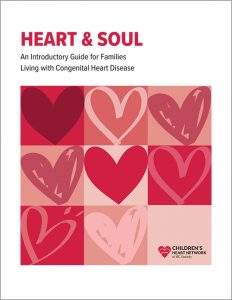
- Accepting your feelings
- Talking about your feelings
- Telling your family and friends
- Building your support team
- Dealing with stress
- Understanding the cardiovascular system
- Understanding congenital heart disease
- Understanding congestive heart failure
- Understanding cyanosis
- Understanding medications
- Finding trustworthy online resources
- Bloodwork
- Chest X-ray
- CT scan
- Echocardiogram
- Electrocardiogram (ECG or EKG)
- Heart catheterization
- Magnetic resonance imaging (MRI)
- Oxygen saturation test
- Transesophageal echocardiogram (TEE)
The forms and information sheets in this appendix will help you keep important data readily available, for yourself and others who take care of your child.
Keep “My Child’s Important Medical Information” on your phone and fridge, on your baby’s car seat/stroller, with caregivers, and at daycare.
This appendix contains three documents:
- A Preparation Guide for Calling with Concerns about Your Child’s Health
- My Child’s Important Medical Information
- My Child’s Medications List

It was important to us to join in the care of our child as much as possible. At first this was very little, but eventually we could change their diaper, give them a bath, and hold them during procedures. I think the nurses really appreciate parents who take an active role in the care of their child. —PARENT
A Preparation Guide for Calling with Concerns about Your Child’s Health
A Preparation Guide for Calling with Concerns about Your Child’s Health
My Child’s Important Medical Information
My Child’s Important Medical Information

